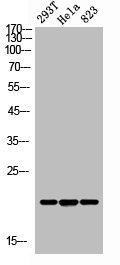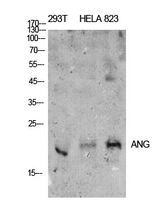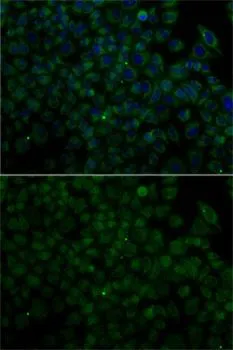Angiogenin antibody [14017]
GTX10600
ApplicationsWestern Blot, ELISA, ImmunoHistoChemistry
Product group Antibodies
ReactivityHuman
TargetANG
Overview
- SupplierGeneTex
- Product NameAngiogenin antibody [14017]
- Delivery Days Customer9
- Application Supplier NoteWB: 1-2 microg/ml. ELISA: 2-8 microg/ml. IHC: 1:1000. *Optimal dilutions/concentrations should be determined by the researcher.Not tested in other applications.
- ApplicationsWestern Blot, ELISA, ImmunoHistoChemistry
- CertificationResearch Use Only
- ClonalityMonoclonal
- Clone ID14017
- ConjugateUnconjugated
- Gene ID283
- Target nameANG
- Target descriptionangiogenin
- Target synonymsALS9, HEL168, RAA1, RNASE4, RNASE5, angiogenin, Homo sapiens epididymis luminal protein 168, RNase 5, angiogenin, ribonuclease, RNase A family, 5, epididymis luminal protein 168, ribonuclease 5, ribonuclease A A1, ribonuclease A family member 5
- HostMouse
- IsotypeIgG1
- Protein IDP03950
- Protein NameAngiogenin
- Scientific DescriptionAngiogenin is a member of the ribonuclease superfamily with approximately 35% amino acid sequence identity with pancreatic RNase. Like other members of the ribonuclease superfamily, angiogenin is a cytotoxic agent that can eliminate cellular protein synthesis. Angiogenin causes protein synthesis inhibition by functioning as a cytotoxic tRNA-specific RNase. Angiogenesis is the formation of blood vessels or capillaries from existing blood vessels due to specific signals. Angiogenin induces the growth of new blood vessels. It stimulates capillary and umbilical vein endothelial cells to produce diacylglycerol and secrete prostacyclin by phospholipase activation. Angiogenin exhibits both angiogenic and non-angiogenic activities and is involved in endothelial cell migration, proliferation, and differentiation. It is produced by a variety of tumor and normal cell types. Cells that express angiogenin include vascular endothelial and smooth muscle cells, fibroblasts, normal colonic epithelium, normal peripheral blood lymphocytes, lung and colonic epithelial tumor cell lines, and primary gastrointestinal adenocarcinomas. Angiogenin is also present in normal human plasma.
- ReactivityHuman
- Storage Instruction-20°C or -80°C,2°C to 8°C
- UNSPSC41116161







![Angiogenin antibody [HL2214] detects Angiogenin protein by immunohistochemical analysis. Sample: Paraffin-embedded mouse tissues. Angiogenin stained by Angiogenin antibody [HL2214] (GTX638218) diluted at 1:100. Antigen Retrieval: Citrate buffer, pH 6.0, 15 min](https://www.genetex.com/upload/website/prouct_img/normal/GTX638218/GTX638218_T-44942_20230303_IHC-P_multiple_M_23031402_747.webp)
![HepG2 whole cell extract and conditioned medium (30 μg) were separated by 15% SDS-PAGE, and the membrane was blotted with Angiogenin antibody [HL2215] (GTX638219) diluted at 1:1000. The HRP-conjugated anti-rabbit IgG antibody (GTX213110-01) was used to detect the primary antibody.](https://www.genetex.com/upload/website/prouct_img/normal/GTX638219/GTX638219_45012_20230421_WB_Fraction_23042500_692.webp)
